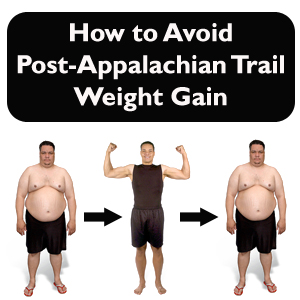[Editors note: Although this post is geared toward those who plan on hiking the AT or who have recently finished, the truth is, this information is applicable to anyone looking to lose a couple of pounds. This is sound nutritional advice from someone who knows what they are talking about (clearly not a reference to myself).]
Remember the advice we got from Appalachian Trail legend, Miss Janet? Well in that post, we tackled the 2nd issue she brought up: Post-Appalachian Trail Depression (which I’ll be covering in more depth in the upcoming Badger Book).
Today, it’s time to confront the other:
How do thru-hikers avoid gaining weight after the Appalachian Trail?
An active person, by today’s standards, gets maybe 60 minutes of exercise per day. In having to balance a job that consumes 50-60 hours of your week, even that seems like a lot. On the AT, exercise is your job. A thru-hiker will bust their ass up and down mountains carrying their life on their back for anywhere from 7 to 12 hours a day. During this process, this individual will consume an unfathomable amount of food- the kind of food invented solely to make people obese. While stuffing their face-hole full of chocolate bars, ramen noodles, pop-tarts, cheese, beef, and Little Debbies on the trail, and pretty much anything with a calorie value in the quadruple digits off the trail, a thru-hiker will soon get a better view of their own skeletal structure. Losing anywhere from 10-30 lbs. is pretty typical. I talked to one guy who had lost 50 lbs. a little more than half way through the trail. He told me this while devouring a king-size snickers.
I talked to a lot of people who were on the trail largely to lose the unwanted pounds they had put on over the years. A noble endeavor, no doubt.
Unfortunately, for most, this weight is put on five times faster than it was lost after finishing the trail. For some, they end up gaining even more weight than they originally lost. If someone has the drive to get up and work their ass off for a half year (figuratively + literally), why is that they put the weight on so quickly? There has to be a dietary approach for someone to keep this weight off in their post-AT life.
Personally, I find this phenomenon to be a bit perplexing. Although I consider myself to be fairly well-schooled in terms of nutrition and exercise theory, I kept coming up with new hypotheses as to why this rapid weight gain would happen.
“Maybe it’s the set-point theory? But then if this theory is true, how can some people lose weight and keep it off? It happens all the time.”
“Maybe it’s a hiker’s metabolism slowing down? But then again, no one eats the way they do on the trail once they get off. I haven’t had a chocolate bar in two months, nor have I even craved one. I’m assuming most also cringe at the sight or thought of a Milky Way. If a hiker’s metabolism slows down, wouldn’t their diet adjust accordingly?”
“Maybe it’s….well, this is all speculation. Perhaps I should ask someone smarter than me.”
So I did.
I reached out to Dr. Nathan Daley, MD, MPH. Dr. Daley practices integrative preventive medicine and performance medicine at the Leonardi Institute in Colorado.
I asked Dr. Daley the following questions:
- Is the weight gain merely an unavoidable consequence of going from hiking 16-24 miles a day to exercising only a few hours per week?
- Is Set Point Theory the logical explanation?
- Are people gaining weight because of their post trail diet, or does it lie more in their exercise habits?
- For most, after finishing the trail, there’s a one to two week period where they’re still battling muscle soreness and fatigue. In other words, the idea of exercise may seem less than appealing. How does one work around this?
- What should a hiker’s post-trail diet look like? Are there any supplements a hiker should take?
Dr. Daley’s answer blew me away. It’s way more thorough than I was anticipating. Not only does it provide information on how to eat once a hiker gets off the trail, it offers advice about foods to favor on the trail to avoid gaining weight afterward.
Dr. Daley’s Advice On How to Avoid Post-Appalachian Trail Weight Gain
(This content now lives in Appalachian Trials. Not because I wanted to take it away from you, but because I didn’t want someone who paid $12.99 for a book to feel cheated. I hope you understand. Although I would like for nothing more than to give you all of my work for free, I also enjoy eating dinner and drinking beer, which requires that evil slut we call “money”.)

